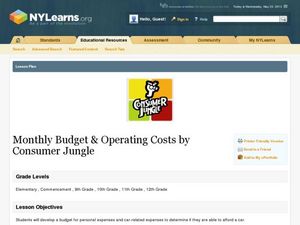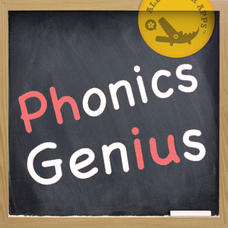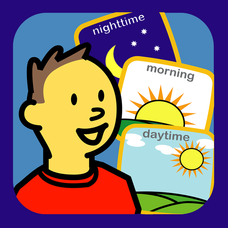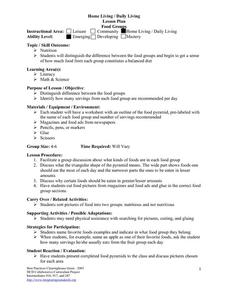English To Go
Comparative and Superlative Adjectives
Who is the tallest person in your family? Are you taller than your siblings? Intermediate language learners can read over and review comparative and superlative adjectives on the first page before they jump to page two for the exercises...
Using English
Emailing Functions Correction and Brainstorming
How do you address a large group of people? How would give someone bad news? How would you share happy news with a friend? Help your intermediate English language classes form these sentiments by providing them with this practice...
Bright Hub Education
All about Owls
Art projects are great ways to stimulate all the senses. Learners with visual impairments create art to better grasp the concept of day and night. They'll discuss the ways they know the difference in the time of day, the animals that are...
Perkins School for the Blind
The Germinator
How does a plant grow from a seed? Observe the process with a clever idea from the PBS television show ZOOM. Watch the video, then have your young botanists create their own germinators. The lesson described here is for visually impaired...
Telefonica
What Did You Do During the Christmas Holiday?
When your English language learners return from winter break, find out how they spent it! This one-page worksheet reviews basic phrases and leisurely activities. After matching basic phrases with small picture illustrations, learners...
Curated OER
A Pleasant Evening: Listening Comprehension Lesson Plan
Dating in America is the subject of a focused listening exercised that could be used with language learners as well as native English speakers. The richly detailed packet includes a writing assignment, supplemental exercises, vocabulary...
NPR
Exploring the American Dream
What is the American Dream? When did this term first gain popularity? Intermediate and advanced English language learners discuss the idea of the American Dream and conduct out-of-class interviews with those who immigrated to the US. On...
English To Go
Articles: A, An, The, or -
Help your young native English speakers discern between a, an, or the with this two-page document. Each article is explained before short practice assessments are offered. A short paragraph on the second page also explains what is known...
English To Go
Countable and Uncountable Nouns
What is a countable noun, and how can you identify one? Read through this sheet with your English language learners. Lots of helpful questions are included to help your class identify which nouns are countable and which are not. Then,...
PLS 3rd Learning
A Place to Hang Your Hat
Kids get real about moving out and living on their own. They review landlord/tenant laws, discuss housing options and then check the classified ads. Individually or in pairs, they research housing options and discuss topics such as...
PLS 3rd Learning
Surviving Solo Wisdom: A Guided Interview
No one said it was going to be easy to move out and live on your own. Kids find out through personal interview what life is like when one is out on his own. They interview a parent, ask for advice, and discuss common themes with the...
PLS 3rd Learning
Monthly Budget & Operating Costs
What teenager wouldn't want a car? But before they make that big purchase, this exercise helps them to understand the costs involved. It includes a worksheet to calculate expenses like taxes and fees, maintenance, gas and insurance, as...
PLS 3rd Learning
Priceless
The message that buying things brings happiness is everywhere. Teenagers are not immune to this marketing strategy and benefit from reflecting on the relentless pressure to spend. This exercise invites young adults to consider the value...
PLS 3rd Learning
Shopping for a Credit Card
Young people often get themselves into trouble with credit cards because they don't fully understand interest rates, fees, etc. This activity requires teens to research and record information on three different credit cards in order to...
PLS 3rd Learning
Find the Fees
Before teens head off to college or the workforce, they need to understand the world of credit. Here, they look online at credit card agreements to find hidden fees and rates. The online activity guides them through and even assesses...
Utah Education Network (UEN)
Values
Being self-aware of personal wants, needs, and values is a big part of growing up. Here, you'll find seven different teaching options and two different introductions to a lesson on getting learners to think about their personal values....
Innovative Mobile Apps
Phonics Genius
Readers at any level who are practicing phonics will benefit from a highly customizable set of features designed for instruction and practice. The extensive library of phonemes and exemplar words covers sounds from the a in cat to the zh...
Bee Visual
Choiceworks
Check out this clever way to help children learn to navigate daily schedules, choices, and feelings. This application supports the completion of routines and promotes positive choices that can be used at school and home. It is ideal for...
Curated OER
Developing Presentation Skills by Using Authentic Literature
Advanced level ESL learners engage in an increasing verbal communication skills through children's literature. The focus of these activities is for children to develope presentation skills. Each activity would compliment any class room.
Curated OER
Home Living/ Daily Living: Food Groups
What are the best foods to eat, and how much is too much? Kids discuss the importance of eating the right amount of each of the four food groups. They discuss the food pyramid and make meals by cutting and pasting foods from a magazine...
Curated OER
Withdrawing Money from an ATM
Taking twenty dollars out of the ATM seems like second nature, once you get the hang of it. The class practices the steps needed to withdraw money from the ATM and then performs the task at an actual bank. The lesson plan has the...
Curated OER
Home Living/ Daily Living: Food Pyramid
What did you have for lunch? Did it contain all four food groups? Help your special education class make good food choices and recognize foods in each of the four food groups. They look at images and discuss the foods on the food pyramid...
Curated OER
First-aid Safety Skills
Everyone gets minor cuts and scrapes now and then. Provide your special education class with the skills they needs to clean and bandage a small wound. Use read marker (fake blood) on your arm and show your class how to wash and dress it....
Curated OER
Home Living/Daily Living: Selecting an Outfit
When people make clothing choices, they should be attempting to buy clothes that are the proper size. Unfortunately, for most that is a skill that they have never been taught. Make sure your special education learners can purchase...

























